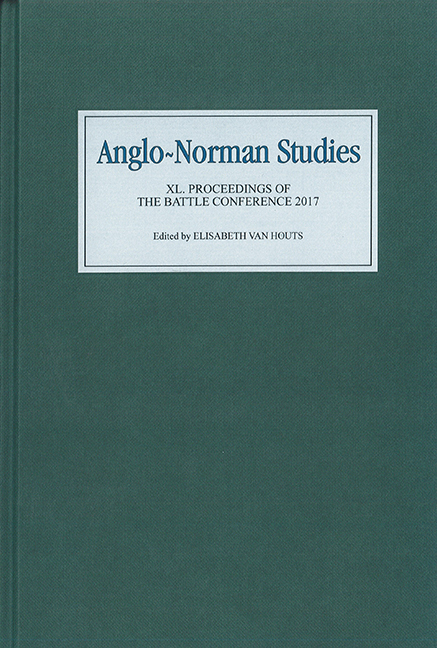Book contents
- Frontmatter
- Contents
- Illustrations and tables
- Editor's preface
- Abbreviations
- The R. Allen Brown Memorial Lecture, 2017
- The R. Allen Brown Memorial Lecture, 2016
- The Marjorie Chibnall Memorial Essay, 2017
- Becket vult: the Appropriation of St Thomas Becket's Image during the Canterbury Dispute, 1184–1200 (The Marjorie Chibnall Memorial Essay)
- La Bataille de Bouvines reconsiderée
- Abbot Peter the Venerable's Two Missions to England (1130 and 1155/1156)
- La production manuscrite anglo-normande et la Bible d'Herman de Valenciennes: usage et réception d'un livre vernaculaire (xii e–xiv e siècles)
- Ralph Niger and the Books of Kings
- From Captivity to Liberation: the Ideology and Practice of Franchise in Crusading France
- Daughter of Fulk, Glory of Brittany’: Countess Ermengarde of Brittany (c.1070–1147)
- The Idea of ‘Empire’ as Hegemonic Power under the Norman and Plantagenet Kings (1066–1204)
- Child Kingship and Notions of (Im)maturity in North-Western Europe, 1050–1262
- Note: A Micro-Economy of Salvation: Further Thoughts on the ‘Annuary’ of Robert of Torigni
Child Kingship and Notions of (Im)maturity in North-Western Europe, 1050–1262
from The Marjorie Chibnall Memorial Essay, 2017
Published online by Cambridge University Press: 17 July 2018
- Frontmatter
- Contents
- Illustrations and tables
- Editor's preface
- Abbreviations
- The R. Allen Brown Memorial Lecture, 2017
- The R. Allen Brown Memorial Lecture, 2016
- The Marjorie Chibnall Memorial Essay, 2017
- Becket vult: the Appropriation of St Thomas Becket's Image during the Canterbury Dispute, 1184–1200 (The Marjorie Chibnall Memorial Essay)
- La Bataille de Bouvines reconsiderée
- Abbot Peter the Venerable's Two Missions to England (1130 and 1155/1156)
- La production manuscrite anglo-normande et la Bible d'Herman de Valenciennes: usage et réception d'un livre vernaculaire (xii e–xiv e siècles)
- Ralph Niger and the Books of Kings
- From Captivity to Liberation: the Ideology and Practice of Franchise in Crusading France
- Daughter of Fulk, Glory of Brittany’: Countess Ermengarde of Brittany (c.1070–1147)
- The Idea of ‘Empire’ as Hegemonic Power under the Norman and Plantagenet Kings (1066–1204)
- Child Kingship and Notions of (Im)maturity in North-Western Europe, 1050–1262
- Note: A Micro-Economy of Salvation: Further Thoughts on the ‘Annuary’ of Robert of Torigni
Summary
When Rigord (d. c.1207) recalled the contemporary reception of Philip II ‘Augustus’ (1165–1223) sometime after his succession to the French throne as a fourteen-yearold boy in 1179, the monk of Saint-Denis claimed that ‘the knights of all of France, the citizens, and other townspeople, seeing the marvellous works of the king being done in their own time…regarded the king as an adolescent of innately good character and…praised God who gave such a powerful ruler to men’. Such panegyric praise for the young king's potestas in the early 1180s was unadulterated hyperbole from a writer presenting his narrative to Philip several years later, after the Treaty of Boves in 1185 and almost certainly following Philip's return from the Holy Land in 1191 or 1192. Nevertheless, we can contrast Rigord's description of Philip's maturity and ability to rule alone as adolescens with Matthew Paris's account, some eighty years later, of the rule of Alexander III, king of Scots (1241–1286), when he, like Philip, was in his mid-to-late teens. Writing of events in 1257, several years after Alexander's succession as a seven-year-old boy in July 1249, Matthew claimed that the king ‘from whose adolescence the greatest benefit was hoped for the kingdom of Scotland – misgoverned too unbecomingly … and to prevent his breaking out in worse ways they [the inhabitants and natives of Scotland] placed the king himself and the queen under custody again’.
Rigord and Matthew's accounts of two adolescent kings both acknowledge the relationship between notions of male maturity and royal power, but they also provide indications of important continuities and changes in contemporary understanding of a boy king's progression to adulthood over the central Middle Ages. For both Rigord and Matthew, a ruler's adolescentia corresponded with his late teens, suggesting stability in the acceptance of established stages of the male life cycle between kingdoms and over time. Despite this comparable notion of the concept of adoles- cence, however, those around Philip and Alexander held different views regarding provisions for the boy kings and their kingdoms as they negotiated their transition to adulthood. Matthew Paris's passage introduces an explicitly legal context to Alexander's maturity; Alexander and his wife Margaret (1240–1275) needed to be placed sub custodia for the good of the kingdom. This is not the sole indicator of a more legally defined notion of maturity by the mid thirteenth century.
- Type
- Chapter
- Information
- Anglo-Norman Studies XLProceedings of the battle conference 2017, pp. 197 - 212Publisher: Boydell & BrewerPrint publication year: 2018

